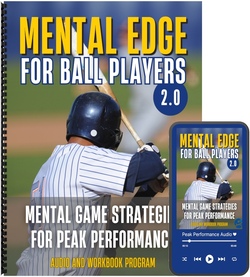How Do You Improve Even When You’re Playing Well?
Summary
he best players don’t wait for slumps to work on their game — they focus on improving baseball performance every single day. By evolving your skills, adopting a growth mindset, training your mental game, raising your baseball IQ, and setting new goals, you create long-term success instead of short-term peaks. When you treat improvement as a habit, you stay consistent, confident, and ahead of the competition. No matter how well you’re playing, there’s always another level to reach — and committing to growth is what separates good players from great ones.
When do you focus most on improving baseball performance?
Many times, when players are in a rut, they spend hours working on their game. They look for ways to rebuild their mechanics and regain their rhythm. These players often ask for feedback from their coaches, carry out more video sessions, or seek advice from their teammates. All these strategies are appropriate and effective responses to performance ruts. Each of these methods helps players recover their form.
However, when many players are on a roll, they tend to just go with the flow. Instead of looking to improve baseball performance further, they maintain the status quo. They become satisfied with their current level of play.
The problem with that approach is that it compromises your consistency and hinders achieving greater success.
Your approach to performance determines how much you can achieve throughout your career. When you are committed to being better today than yesterday, you build a mindset rooted in steady growth.
When you consistently strive to improve, small daily gains compound over time into major breakthroughs. This approach not only strengthens your skills but also builds stable confidence. In fact, it is the commitment to continual improvement that is the hallmark of the best players in the game.
Pittsburgh Pirates starting pitcher Paul Skenes has been outstanding through the first 50 starts of his MLB career. In his second major league season, Skenes has a 2.07 ERA with 181 strikeouts in 161 innings.
While it may appear there is little room for improvement, Skenes has a different mindset. Skenes has shifted his focus to what’s next. Skenes sees his first 50 games as just the start of his journey.
SKENES:
“Just gotta do it in the next 50, and the 50 after that. Consistency is the biggest thing, I feel… I definitely think that [there is a way to get even better]. I’ve just got to find it. To be honest, I don’t know what it is yet. It’s there. I think that’s what energizes me, and it’s what makes me keep showing up to the field, doing the work in the offseason. It’s just getting better. I know I can get better. I’ve just got to figure out how.”
Improvement is not just for the times when you are struggling. The focus on improving baseball performance should be a habit and the guiding principle you take to the ballpark every day.
The very best players don’t wait for a slump to sharpen their skills; they chase growth even at their peak. When you strive for excellence, you fuel long-term success.
5 Ways to Elevate Your Baseball Play Even When Playing at Your Peak
1. Evolve Your Game
Even when you’re playing well, there’s always room to grow. Pitchers can add new pitches or refine control, while hitters can work on driving the ball to all fields or improving two-strike approaches. By adapting and adding new skills, you stay unpredictable and keep improving baseball performance long term.
2. Adopt a Growth Mindset
The key to improving baseball performance is believing you can always get better. A growth mindset pushes you to embrace challenges, learn from setbacks, and stay motivated even after success. Instead of getting comfortable, you keep searching for ways to raise your game.
3. Focus on Mental Skills
Baseball is a mental game. Strong mental skills help you perform under pressure and stay consistent. Use visualization, mindfulness, breathing techniques, and pre-game routines to sharpen focus and confidence. Adding mental training to your routine is a proven way of improving baseball performance when it matters most.
4. Expand Your Baseball IQ
The smartest players on the field separate themselves with knowledge. Study pitchers’ tendencies, defensive shifts, and game situations to gain an edge. Raising your baseball IQ helps you anticipate plays before they happen — a powerful tool for consistently improving baseball performance.
5. Challenge Yourself with New Goals
Never stop setting goals. The moment you hit one milestone, create another. Whether it’s improving on-base percentage, building leadership skills, or adding a new pitch, raising the bar prevents stagnation and ensures you’re always improving baseball performance season after season.’
FAQ – Improving Baseball Performance
Q: How can I keep improving baseball performance when I’m already playing well?
A: The key is to avoid complacency. Even at your peak, focus on small daily improvements such as adding new skills, sharpening your mental game, and setting fresh goals. Continuous growth prevents plateaus and fuels long-term success.
Q: What mental skills help improve baseball performance?
A: Visualization, mindfulness, controlled breathing, and pre-game routines all strengthen confidence and focus. Developing mental toughness is just as important as physical training for improving baseball performance in pressure situations.
Q: Why is baseball IQ important for performance?
A: A high baseball IQ helps you anticipate plays, read opponents, and make smarter in-game decisions. By studying strategy, pitcher tendencies, and defensive shifts, you gain a mental edge that directly contributes to improving baseball performance.
Q: How can I bounce back mentally after a bad game?
A: The key is to separate performance from identity. Reflect on lessons learned, reset your focus, and use positive self-talk to build resilience. Developing short-term memory for mistakes helps you stay confident and ready for the next opportunity.
Q: What role does confidence play in improving baseball performance?
A: Confidence allows players to trust their training and play freely without overthinking. When athletes believe in their abilities, they react faster, stay composed under pressure, and perform closer to their true potential. Building confidence is a cornerstone of the mental game.
Related Sports Psychology Articles
- 5 Strategies to Handle Losing Your Role as a Baseball Player
- 5 Mental Strategies to Overcome Performance Anxiety
- 4 Ways to Develop a Positive Team Culture
*Subscribe to The Sports Psychology Podcast on iTunes
*Subscribe to The Sports Psychology Podcast on Spotify
The Mental Edge for Ball Players (Digital Download)
“The Mental Edge for Ball Players” audio and workbook program teaches you to get a competitive edge in baseball and softball by overcoming a lack of focus, low self-confidence and other mental game obstacles. Learn practical mental strategies to improve your performance in competition.



